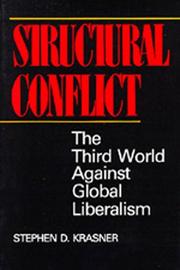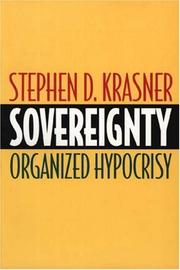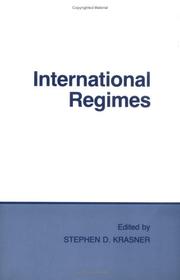| Listing 1 - 6 of 6 |
Sort by
|

ISBN: 0520054784 0520054008 9780520054783 9780520054004 Year: 1985 Volume: [12] Publisher: Berkeley University of California press
Abstract | Keywords | Export | Availability | Bookmark
 Loading...
Loading...Choose an application
- Reference Manager
- EndNote
- RefWorks (Direct export to RefWorks)
Economic order --- International economic relations --- Developing countries --- Foreign economic relations --- 339.96 --- 339.92 --- Developing Countries --- AA / International- internationaal --- 347.720.1 --- 333.165 --- 338.340 --- 333.166 --- 333.163 --- 333.164.0 --- 333.160 --- 333.432.8 --- 338.043 --- Economic policy, Foreign --- Economic relations, Foreign --- Economics, International --- Foreign economic policy --- Interdependence of nations --- International economic policy --- International economics --- New international economic order --- Economic policy --- International relations --- Economic sanctions --- Ontwikkelingshulp. Ontwikkelingssamenwerking. Ontwikkelingsproblematiek --- Economische samenwerking en integratie. Tolunie --- Foreign economic relations. --- Aard, definitie, eigenschappen van handelsvennootschappen. Bedrijfspatrimonium. Multinationale bedrijven. --- Afrikaanse Ontwikkelingsbank. --- Algemene ontwikkeling in de Derde Wereld. --- Aziatische Ontwikkelingsbank. --- Inter-Amerikaanse Ontwikkelingsbank. --- Internationale Bank voor Herstel en Ontwikkeling: algemeen. --- Internationale financiële instellingen: algemeen. --- Internationale monetaire organisatie. Internationaal Muntfonds. Algemene leningovereenkomsten. --- Technologische vooruitgang. Automatisering. Computers. Werkgelegenheid en informatica. --- International economic relations. --- 339.92 Economische samenwerking en integratie. Tolunie --- 339.96 Ontwikkelingshulp. Ontwikkelingssamenwerking. Ontwikkelingsproblematiek --- Internationale financiële instellingen: algemeen --- Inter-Amerikaanse Ontwikkelingsbank --- Internationale Bank voor Herstel en Ontwikkeling: algemeen --- Afrikaanse Ontwikkelingsbank --- Aziatische Ontwikkelingsbank --- Internationale monetaire organisatie. Internationaal Muntfonds. Algemene leningovereenkomsten --- Technologische vooruitgang. Automatisering. Computers. Werkgelegenheid en informatica --- Algemene ontwikkeling in de Derde Wereld --- Aard, definitie, eigenschappen van handelsvennootschappen. Bedrijfspatrimonium. Multinationale bedrijven --- Developing countries - Foreign economic relations

ISBN: 069100711X 0691007020 1400812429 9786612753848 1282753843 1400823269 9780691007021 9781400823260 9780691007113 Year: 1999 Publisher: Princeton, N.J. ; Chichester : Princeton University Press,
Abstract | Keywords | Export | Availability | Bookmark
 Loading...
Loading...Choose an application
- Reference Manager
- EndNote
- RefWorks (Direct export to RefWorks)
The acceptance of human rights and minority rights, the increasing role of international financial institutions, and globalization have led many observers to question the continued viability of the sovereign state. Here a leading expert challenges this conclusion. Stephen Krasner contends that states have never been as sovereign as some have supposed. Throughout history, rulers have been motivated by a desire to stay in power, not by some abstract adherence to international principles. Organized hypocrisy--the presence of longstanding norms that are frequently violated--has been an enduring attribute of international relations. Political leaders have usually but not always honored international legal sovereignty, the principle that international recognition should be accorded only to juridically independent sovereign states, while treating Westphalian sovereignty, the principle that states have the right to exclude external authority from their own territory, in a much more provisional way. In some instances violations of the principles of sovereignty have been coercive, as in the imposition of minority rights on newly created states after the First World War or the successor states of Yugoslavia after 1990; at other times cooperative, as in the European Human Rights regime or conditionality agreements with the International Monetary Fund. The author looks at various issues areas to make his argument: minority rights, human rights, sovereign lending, and state creation in the nineteenth and twentieth centuries. Differences in national power and interests, he concludes, not international norms, continue to be the most powerful explanation for the behavior of states.
Sovereignty. --- #SBIB:327.1H10 --- #SBIB:324H20 --- 814 Theorie van de internationale betrekkingen --- Sovereignty --- State sovereignty (International relations) --- International law --- Political science --- Common heritage of mankind (International law) --- International relations --- Self-determination, National --- Internationale betrekkingen: theorieën --- Politologie: theorieën (democratie, comparatieve studieën….) --- Law and legislation --- Souveraineté --- Treaties, International

ISBN: 0801415500 0801492505 9780801492501 Year: 1991 Publisher: Ithaca Cornell university press
Abstract | Keywords | Export | Availability | Bookmark
 Loading...
Loading...Choose an application
- Reference Manager
- EndNote
- RefWorks (Direct export to RefWorks)
International law. --- International organization --- International relations --- #SBIB:327.1H10 --- Federation, International --- Global governance --- Interdependence of nations --- International administration --- International federation --- Organization, International --- World federation --- World government --- World order --- World organization --- Law of nations --- Nations, Law of --- Public international law --- Research. --- Internationale betrekkingen: theorieën --- International law --- Congresses and conventions --- Peace --- Political science --- International agencies --- International cooperation --- Security, International --- World politics --- Law --- Research --- International organization - Research. --- International relations - Research. --- Communauté internationale --- Relations internationales --- Relations économiques internationales --- Organisations internationales --- Recherche

ISBN: 0231505418 9780231505413 0231121792 9780231121798 0231121784 9780231121781 Year: 2001 Publisher: New York (N.Y.) Columbia university press
Abstract | Keywords | Export | Availability | Bookmark
 Loading...
Loading...Choose an application
- Reference Manager
- EndNote
- RefWorks (Direct export to RefWorks)
Some of the most pressing issues in the contemporary international order revolve around a frequently invoked but highly contested concept: sovereignty. To what extent does the concept of sovereignty-as it plays out in institutional arrangements, rules, and principles-inhibit the solution of these issues? Can the rules of sovereignty be bent? Can they be ignored? Do they represent an insurmountable barrier to stable solutions or can alternative arrangements be created? Problematic Sovereignty attempts to answer these and other fundamental questions by taking account of the multiple, sometimes contradictory, components of the concept of sovereignty in cases ranging from the struggle for sovereignty between China and Taiwan to the compromised sovereignty of Bosnia under the Dayton Accord. Countering the common view of sovereignty that treats it as one coherent set of principles, the chapters of Problematic Sovereignty illustrate cases where the disaggregation of sovereignty has enabled political actors to create entities that are semiautonomous, semi-independent, and/or semilegal in order to solve specific problems stemming from competing claims to authority.
Sovereignty. --- POLITICAL SCIENCE / International Relations / General. --- Sovereignty --- State sovereignty (International relations) --- International law --- Political science --- Common heritage of mankind (International law) --- International relations --- Self-determination, National --- Law and legislation
Book
Year: 1988 Publisher: New York (N.Y.) Carnegie council on ethics and international affairs
Abstract | Keywords | Export | Availability | Bookmark
 Loading...
Loading...Choose an application
- Reference Manager
- EndNote
- RefWorks (Direct export to RefWorks)


ISBN: 150171144X 9781501711442 0801440882 9780801440885 0801488206 9780801488207 Year: 2018 Publisher: Ithaca, NY
Abstract | Keywords | Export | Availability | Bookmark
 Loading...
Loading...Choose an application
- Reference Manager
- EndNote
- RefWorks (Direct export to RefWorks)
After the devastation of World War II, Germany and Japan built national capitalist institutions that were remarkably successful in terms of national reconstruction and international competitiveness. Yet both "miracles" have since faltered, allowing U.S. capital and its institutional forms to establish global dominance. National varieties of capitalism are now under intense pressure to converge to the U.S. model. Kozo Yamamura and Wolfgang Streeck have gathered an international group of authors to examine the likelihood of convergence-to determine whether the global forces of Anglo-American capitalism will give rise to a single, homogeneous capitalist system.The chapters in this volume approach this question from five directions: international integration, technological innovation, labor relations and production systems, financial regimes and corporate governance, and domestic politics. In their introduction, Yamamura and Streeck summarize the crises of performance and confidence that have beset German and Japanese capitalism and revived the question of competitive convergence. The editors ask whether the two countries, confronted with the political and economic exigencies of technological revolution and economic internationalization, must abandon their distinctive institutions and the competitive advantages these have yielded in the past, or whether they can adapt and retain such institutions, thereby preserving the social cohesion and economic competitiveness of their societies.
Capitalism --- Japan --- Germany --- Economic policy.
| Listing 1 - 6 of 6 |
Sort by
|

 Search
Search Feedback
Feedback About UniCat
About UniCat  Help
Help News
News